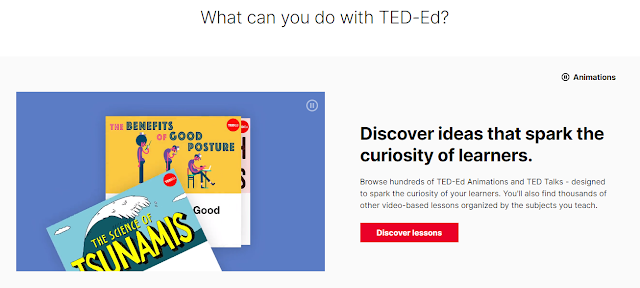Enhance language learning with TED-Ed
As language teachers, we are always looking for innovative ways to engage our students and promote language learning. And today I would like to introduce a valuable resource that can help us achieve this goal, which is TED-Ed. It's an educational initiative that produces and shares animated videos, lesson plans, and quizzes designed to enhance learning. And I also think TED-Ed is a great resource for us as language teachers who want to incorporate blended learning into our classrooms.
 |
| From ed.ted.com |
https://ed.ted.com/on/8Jm2J6Qz#watch
 |
| From ed.ted.com |
As you can see, I put some open answer questions about the videos in my lesson. And it's your choice to create your own videos and questions. Here's the link about how to create TED-Ed Lessons, it would be helpful to take a look if you want to create your own lesson on TED-Ed.
https://help.ted.com/h%20c/en-us/articles/360005307714-How-do-I-create-TED-Ed-Lessons-
As we can see, there are so many ways that we can use TED-Ed to enhance our language teaching.
 |
| From ed.ted.com |
 |
| From ed.ted.com |
For example, we can use TED-Ed to introduce new vocabulary words and concepts by providing students with a list of key vocabulary words before watching the video and then have students watch for those words as they watch the video. We can also assign students into small groups to discuss the video's topic or question. This can be an excellent way for students to practice speaking and listening skills. We can also practice students' writing ability by assigning students to write a response essay or a short paragraph summarizing what they learned after watching the video.
As showed in my sample lesson, the most obvious advantage of using TED-Ed is that videos are usually designed to be visually appealing and engaging, which can help our students stay focused and interested in the topic being presented. And there are wide range of videos and topics, we can find videos that are relevant to our students' interests and language levels easily. Furthermore, the flexibility of online TED-Ed lessons allows students to watch and learn at their own pace and in their own time.
There are also some limitation of TED-Ed, for example, TED-Ed lessons are all pre-recorded, and such kind of one-way communication does not offer any opportunity for students to interact with the teacher or ask questions in real-time. And watching videos alone may not be enough for students to fully develop their language skills. We still need to aim to incorporate more interactive learning activities to reinforce students' language skills.



yes! TED is always a good helper for us. Your sharing about it is very detailed. Thank you!
ReplyDelete